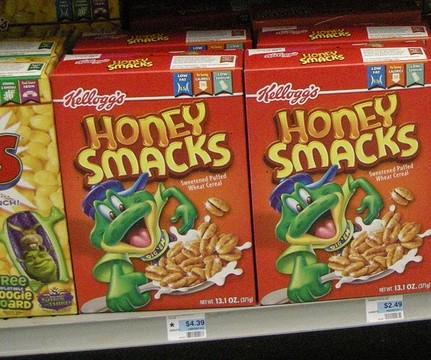Federal health officials and their state partners are investigating Salmonella Mbandaka outbreak linked to Kellogg's Honey Smacks cereal that has so far sickened 73 people in 31 states, the US Centers for Disease Control and Prevention (CDC) announced yesterday.
On the same day, Kellogg's recalled 15.3-ounce and 23-ounce packages of Honey Smacks cereal that were distributed across the United States, with limited distribution in Costa Rica, Guatemala, Mexico, the Caribbean, Guam, Tahiti, and Saipan.
Interviews point to Honey Smacks
The CDC said public health investigators are using PulseNet, the national subtyping network, to identify illnesses that may be part of the outbreak. Illnesses began on Mar 3, with the latest onset so far reported on May 28.
Interviews with 39 sick people about foods and other exposures the week before they became ill revealed that 30 (77%) had eaten cold cereal, with 14 of them specifically identifying Kellogg's Honey Smacks. "Ill people in this outbreak reported this cereal more often than any other cereals or food items," the CDC said.
Cases are broadly spread across the United States. Patient ages range from younger than 1 year to 87 years, and 65% of the affected people are female. Of 55 people with information available, 24 (44%) were hospitalized for their infections. No deaths have been reported.
Focus on third-party manufacturer
In its voluntary recall notice yesterday, Kellogg's said the cereal has best-if-used-before dates of Jun 14, 2018, through Jun 14, 2019.
The company said that after the CDC and Food and Drug Administration (FDA) notified it of the outbreak illnesses, it launched an investigation with the third-party manufacturer that makes Honey Smacks. Kellogg's asked consumers who bought the potentially affected product to discard it and contact the company for a refund.
In a separate announcement, the FDA said its staff has started an inspection at the facility that makes Honey Smacks and is working quickly with the company to gather more information.
Advice for consumers
Meanwhile, the CDC urged consumers to throw the cereal away, even if some of it was eaten and no one got sick. "If you store cereal in a container without the packaging and don't remember the brand or type, throw it away," it said, adding that consumers should thoroughly wash the container with warm, soapy water before using it again to avoid further contamination.
Salmonella outbreaks have been linked to other cereals before. For example, a 2008 event involving Salmonella Agona was tied to rice and wheat puffed cereal made by Malt-O-Meal, sickening at least 28 people in 15 states.
See also:
Jun 14 CDC outbreak announcement
Jun 14 Kellogg's recall notice
Jun 14 FDA announcement
May 15, 2008, CIDRAP News story "Cereal-linked Salmonella outbreak slowly grows"





















